File Picker Module: Integration and Examples
2024-11-01
file-pickers.RmdModule Overview
The File Picker Module is designed to facilitate the selection of Platform project files . It displays a table of available files, allowing users to choose files based on different criteria. It supports both single and multiple file selections and integrates seamlessly with the server-side logic of your Shiny app. By leveraging this module, you can streamline file management tasks, enhance user experience, and ensure that file selection is handled consistently across various parts of the application.
UI Function
The module UI function creates an action button that triggers a modal dialog for file selection.

The UI function also allows you to customize the action button label
(button_label parameter), icon (button_icon
parameter) and width (button_width parameter) to suit the
needs of your application.
UI Function Call
mod_file_picker_ui("file_picker_1")Server Function
The server function handles the logic for displaying the file picker modal and managing file selection. It provides features such as table filtering, pagination, and selection modes. The most crucial argument for this function is files_df, which is a data frame that developers must prepare and provide. This data frame should include columns for file paths and other relevant metadata.
Parameters:
id: A unique identifier for the module instance.
files_df: A data frame or reactive expression returning a data frame, containing the files information. This is the most important argument, and it must include columns for the file paths and any other relevant metadata. If provided as a reactive expression, ensure it returns a data frame in the required format.
selection: Specifies the selection mode (‘single’ or ‘multiple’). Defaults to ‘single’.
file_identifier_column: The column in files_df used to identify selected files. Defaults to path.
default_page_size: The number of rows per page in the file table. Defaults to 10.
use_bslib_theme: Choose if the bslib theme is used for the modal UI. Defaults to
FALSE.show_guide: A boolean indicating whether to display the File Selection Guide above the file table. Defaults to
TRUE. When set toFALSE, the guide will not be shown, allowing developers to hide the instructional text entirely if they prefer to customize the modal experience.-
guide_content: A string that controls the content of the File Selection Guide. This parameter has two modes:
- “default”: Displays the default guide, which provides general instructions for selecting files, using filters, and submitting selected files.
-
File path: Developers can provide a path to a
custom Markdown (
.md) file, and its content will be displayed in the guide. This is useful for apps that require specific instructions tailored to the files or the project context. If the app is developed using the Golem framework, it’s recommended to store the file inside theinst/directory and reference it usingsystem.file("path/inside/inst/filename.md", package = "yourgolemapp").
Tip: You can use the utility function
get_all_project_files() to fetch all project files along
with their metadata from the Seven Bridges File System (SBFS) that is
expected to exist on the instance where the app will be hosted. This
function returns a data frame containing comprehensive file information,
making it an ideal input for the mod_file_picker_server() function.
Check vignette("load-files-and-metadata") for more details
about the get_all_project_files() function.
Note: If your Shiny app utilizes the bslib theme,
ensure that use_bslib_theme is set to TRUE to
maintain consistent styling across the modal dialog.
Server Function Call
mod_file_picker_server("file_picker_1", files_df, selection = "single")Or
mod_file_picker_server("file_picker_1", files_df, selection = "multiple")File Picker Modal Dialog
When using the File Picker Module, you need to specify which information should be returned for the selected row(s). This is done through the file_identifier_column parameter. By default, file_identifier_column is set to path, as this is typically the most useful information for subsequent steps in the application. However, you can set this parameter to any other column in the files_df data frame that contains the desired information.
It is crucial that the specified column, whether path or another value, exists in the files_df data frame provided to the module. The module will return a reactive expression containing the information from the specified file_identifier_column for the selected file(s).
When the modal dialog for file selection opens, the module displays a preview table of files and allows users to select files based on the specified selection mode (‘single’ or ‘multiple’). Depending on the selection mode, the table will show either radio buttons (for single file selection) or checkboxes (for multiple file selections), enabling users to choose one or more files. Below, you will find examples illustrating both single-file and multi-file picker interfaces.
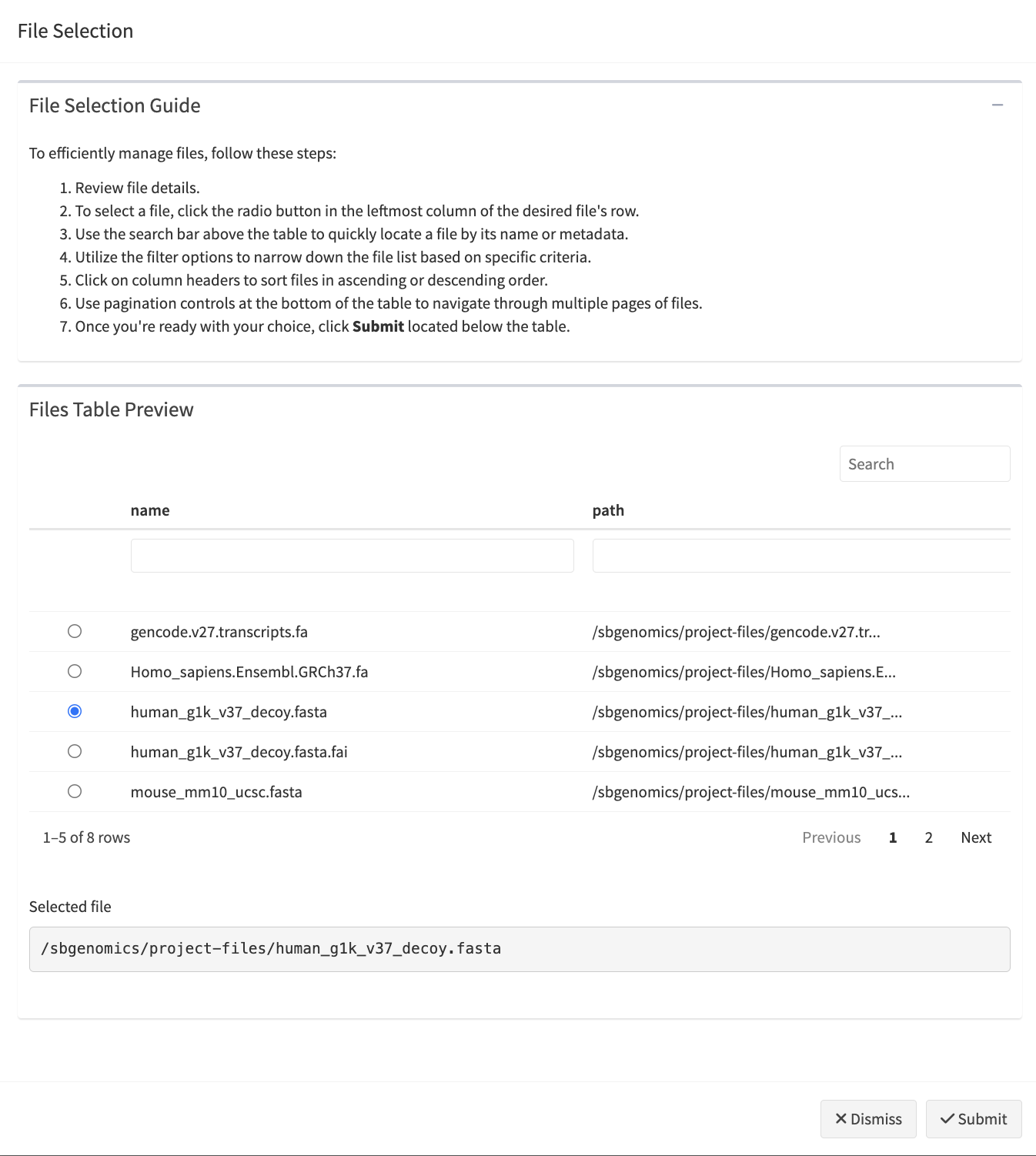
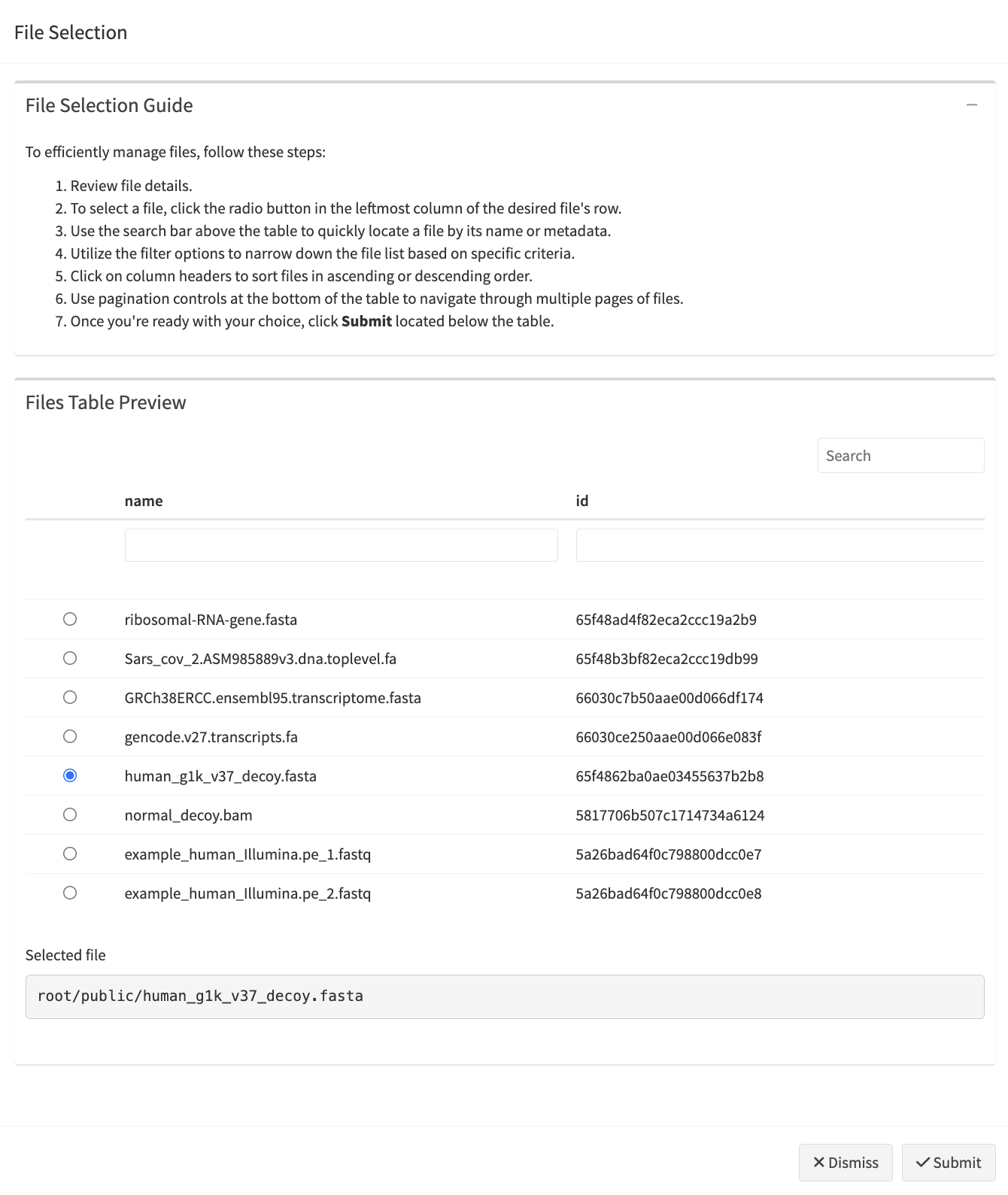
Customizing the File Selection Guide
By default, the File Picker Module includes a File Selection Guide at
the top of the modal, providing users with instructions on how to select
and filter files. You can control the visibility of this guide using the
show_guide parameter. If set to FALSE, the
guide will not be displayed, giving you the flexibility to hide the
instructional content entirely.
If you wish to provide customized guidance specific to your app, the
guide_content parameter allows for custom content to be
displayed within the guide. By providing a path to a Markdown file
(.md), the content of that file will be converted to HTML
and rendered inside the guide. This feature is particularly useful for
projects where detailed or project-specific instructions are necessary.
Check an example of a Markdown file here.
Table options
Table columns are equipped with various filter options depending on the type of data:
-
Numeric Columns: A range slider filter allows users
to narrow down the table by selecting a range of numeric values.
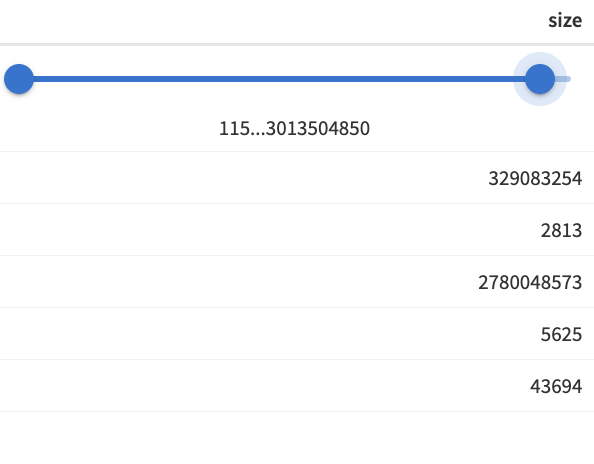 Numeric column range slider
Numeric column range slider
-
Factor Columns: A drop-down filter enables users to
filter the table by selecting specific factor levels.
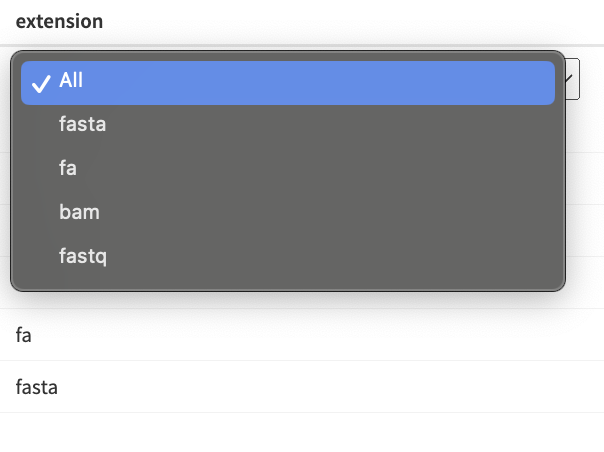 Drop-down filter
Drop-down filter
-
Other Data Types: A basic filter with
case-insensitive text matching is available for other data types.
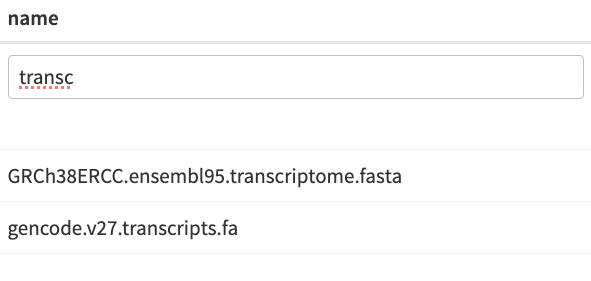 Case-insensitive text matching filter
Case-insensitive text matching filter
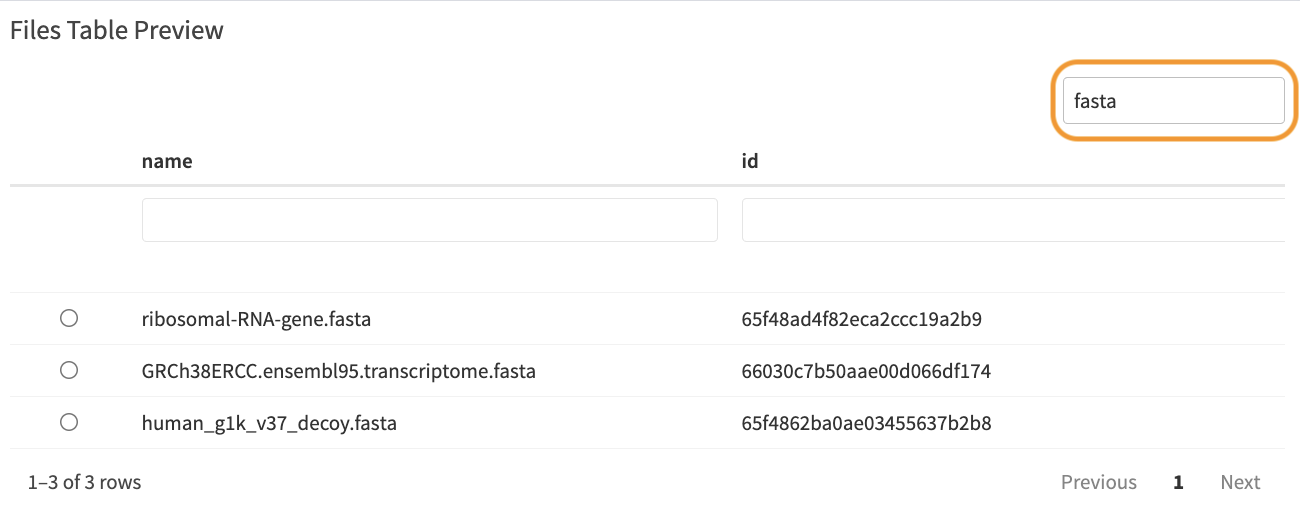
Example: File Picker Module in Action
The following Shiny app demonstrates the usage of the File Picker module. The example includes two versions of the file picker:
- Single File Picker: Allows users to select only one file, utilizing radio buttons for file selection.
- Multiple File Picker: Enables users to select multiple files using checkboxes.
The app utilizes a built-in data frame from the
sbShinyModules package to populate the
files_df parameter of the file picker module.
Note: To run this example on your computer, please ensure you have the sbShinyModules package installed.
library(shiny)
library(sbShinyModules)
# library(bslib) # uncomment if you want to use a Bootstrap theme
# App's UI
ui <- fluidPage(
titlePanel("File Picker Module Examples"),
# theme = bslib::bs_theme(), # uncomment if you want to use a Bootstrap theme
sidebarLayout(
sidebarPanel(
# Single File Picker - UI
fluidRow(
h3("Single File Picker"),
br(),
sbShinyModules::mod_file_picker_ui("single_file_picker"),
br(),
h5("Selected File"),
verbatimTextOutput("single_file_picker_selection", placeholder = TRUE)
),
hr(),
# Multiple Files Picker - UI
fluidRow(
h3("Multiple Files Picker"),
br(),
sbShinyModules::mod_file_picker_ui("multiple_files_picker"),
br(),
h5("Selected Files"),
verbatimTextOutput("mult_files_picker_selection", placeholder = TRUE)
)
),
mainPanel(
# Placeholder
)
)
)
# App Server Logic
server <- function(input, output, session) {
# ----------------------------- Load Files ----------------------------------
# Load a built-in data frame for files
files_df <- sbShinyModules::file_picker_example_data
# Remove units (bytes) from the size column and make it numeric so that it has
# a range filter
files_df$size <- as.numeric(gsub(" bytes", "", files_df$size))
# Alternatively, fetch files from a provided directory (path) using the
# get_all_project_files() utility function. Note that this requires the
# xattrs package, which is not available for Windows systems. Therefore,
# this approach will only work on Unix-based systems.
# files_df <- sbShinyModules::get_all_project_files(
# path = "/sbgenomics/project-files"
# )
# ---------------------------------------------------------------------------
## -------------------- Single File Picker - Server Code --------------------
# Call the file picker module
selected_files_single_picker <- sbShinyModules::mod_file_picker_server(
id = "single_file_picker",
files_df = files_df,
# use_bslib_theme = TRUE, # Uncomment if you want to use a Bootstrap theme
selection = "single",
default_page_size = 5,
show_guide = TRUE,
guide_content = "default"
# nolint start
# If you want to use a custom guide instead of the default,
# comment out the line above (guide_content = "default")
# and uncomment the following line to use the built-in example Markdown
# file:
# guide_content = system.file("app/md/file_picker_custom_guide_example.md", package = "sbShinyModules")
# nolint end
)
# Display selected files
output$single_file_picker_selection <- renderPrint({
validate(
need(
selected_files_single_picker(),
"No file has been selected."
)
)
cat(selected_files_single_picker(), sep = "\n")
})
# ---------------------------------------------------------------------------
## ----------------- Multiple Files Picker - Server Code --------------------
# Call the file picker module
selected_files_mult_picker <- sbShinyModules::mod_file_picker_server(
id = "multiple_files_picker",
files_df = files_df,
# use_bslib_theme = TRUE, # uncomment if you want to use a Bootstrap theme
selection = "multiple",
default_page_size = 5,
show_guide = TRUE,
guide_content = "default"
# nolint start
# If you want to use a custom guide instead of the default,
# comment out the line above (guide_content = "default")
# and uncomment the following line to use the built-in example Markdown
# file:
# guide_content = system.file("app/md/file_picker_custom_guide_example.md", package = "sbShinyModules")
# nolint end
)
# Display selected files
output$mult_files_picker_selection <- renderPrint({
validate(
need(
selected_files_mult_picker(),
"No files have been selected."
)
)
cat(selected_files_mult_picker(), sep = "\n")
})
# ---------------------------------------------------------------------------
}
# Note: To use a Bootstrap theme, ensure you have the 'bslib' package
# installed and loaded in your app.
# 1. Uncomment `library(bslib)` at the beginning of the script.
# 2. Uncomment the `theme = bslib::bs_theme()` line in the UI section.
# 3. In the server logic, set `use_bslib_theme = TRUE` in the
# `mod_file_picker_server()` function calls.
# Run the Shiny app
shinyApp(ui, server)